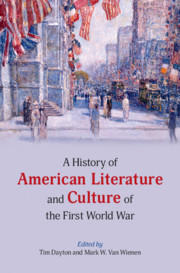Book contents
- A History of American Literature and Culture of the First World War
- A History of American Literature and Culture of the First World War
- Copyright page
- Contents
- Figures
- Contributors
- Acknowledgments
- Introduction America’s Great War at One Hundred (and Counting)
- Part I Genre and Medium
- Part II Settings and Subjects
- Chapter 9 The Peace Movement
- Chapter 10 Americans in France
- Chapter 11 German Americans
- Chapter 12 The English in America
- Chapter 13 Preparedness
- Chapter 14 Propaganda
- Chapter 15 Conscientious Objectors
- Chapter 16 Volunteers
- Chapter 17 African Americans
- Chapter 18 In the Midwest
- Chapter 19 In the South
- Chapter 20 Revolution
- Chapter 21 Monuments and Memorials
- Part III Transformations
- References
- Index
Chapter 18 - In the Midwest
“Borne Back Ceaselessly into the Past”
from Part II - Settings and Subjects
Published online by Cambridge University Press: 23 January 2021
- A History of American Literature and Culture of the First World War
- A History of American Literature and Culture of the First World War
- Copyright page
- Contents
- Figures
- Contributors
- Acknowledgments
- Introduction America’s Great War at One Hundred (and Counting)
- Part I Genre and Medium
- Part II Settings and Subjects
- Chapter 9 The Peace Movement
- Chapter 10 Americans in France
- Chapter 11 German Americans
- Chapter 12 The English in America
- Chapter 13 Preparedness
- Chapter 14 Propaganda
- Chapter 15 Conscientious Objectors
- Chapter 16 Volunteers
- Chapter 17 African Americans
- Chapter 18 In the Midwest
- Chapter 19 In the South
- Chapter 20 Revolution
- Chapter 21 Monuments and Memorials
- Part III Transformations
- References
- Index
Summary
World War I reversed America’s foundational movement of westward settlement. Indeed, some commentators including President Wilson viewed America’s involvement, notwithstanding its eastward orientation, as an extension of Manifest Destiny. Given the Midwest’s democratic associations with pioneers and the Jeffersonian farmer, the notion of the war as a replacement for the frontier was inescapably linked to the region’s unique cultural iconography. This essay considers prose narratives that explore wartime reciprocities running between the Midwest and Europe. The Midwest not only sent hundreds of thousands of men but also increased agricultural production and exportation. Moreover, the region’s democratic heritage was drawn on to bolster support for the war. Conversely, German immigrants experienced xenophobic attacks, bringing the tensions of the war to the home front. Meanwhile, Midwestern soldiers in France were repeatedly struck by the similarity the countryside bore to their native topographies. By registering the topographical familiarity of the New World – and frequently comparing the war with the activities of pioneers – Midwestern writers variously explore, critique, and reject the idea of the war as a replacement for the frontier, or as a fulfillment of the democratic values enshrined in the region’s pioneer and agrarian culture.
- Type
- Chapter
- Information
- Publisher: Cambridge University PressPrint publication year: 2021

